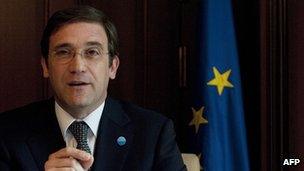Portugal battles to ease crisis and market pressure
- Published

Portugal's prime minister has faced a wave of street protests over austerity
Portugal's prime minister has been meeting his former foreign minister, who resigned this week, trying to persuade him to rescue their coalition.
Talks have been called "constructive" - bringing calm to markets that had feared a possible government collapse.
PM Pedro Passos Coelho is keen to defuse the political crisis and avoid the turmoil of an early election.
President Anibal Cavaco Silva is due to begin talks with the parties on Monday.
The ruling coalition is under intense pressure to stick to the tough austerity targets dictated by Portugal's bailout.
Yields on 10-year Portuguese bonds fell to 7.26% early on Thursday. A sharp spike - topping 8% on Wednesday - had revived market jitters about instability in the eurozone.
Portugal has doggedly stuck to its austerity programme, despite its severe recession.
That has angered trade unions and left-wing parties but brought praise from Portugal's international partners.
"I think Portugal has achieved very remarkable results - certainly, it's been a painful route - and the results that have been achieved have been quite significant, remarkable, if not outstanding," European Central Bank president Mario Draghi said on Thursday.
Political storm
Mr Cavaco Silva is known to be keen to avoid calling early elections, the BBC's Alison Roberts reports from Lisbon.
He is clearly putting pressure on the coalition to patch things up, given the adverse reaction to the crisis in the markets, our correspondent says.
Left-wing opposition parties are demanding early elections, and opinion polls suggest the ruling conservatives would do badly. The Communist Party held a big anti-government rally in central Lisbon on Wednesday.
The crisis began on Monday with the resignation of Finance Minister Vitor Gaspar, who for two years had overseen the unpopular austerity policies.
The prime minister's choice to replace him, the former Treasury Secretary Maria Luis Albuquerque, is seen as just as wedded to austerity, says our Lisbon correspondent.
It was that fact that the foreign minister and junior coalition leader, Paulo Portas, cited in tendering his resignation on Tuesday.
The European Commission President, Jose Manuel Barroso, said he was following the situation "with concern".
Portugal received a bailout worth more than 78bn euros ($102bn; £67bn) in May 2011, on the condition it implemented austerity measures.
Demonstrators have taken to the streets in recent days to protest against planned austerity reforms.
Portugal has been in recession for two years and the economy is expected to contract by 2.3% this year.
- Published3 July 2013
- Published2 July 2013
- Published2 July 2013
- Published2 July 2013
- Published1 July 2013